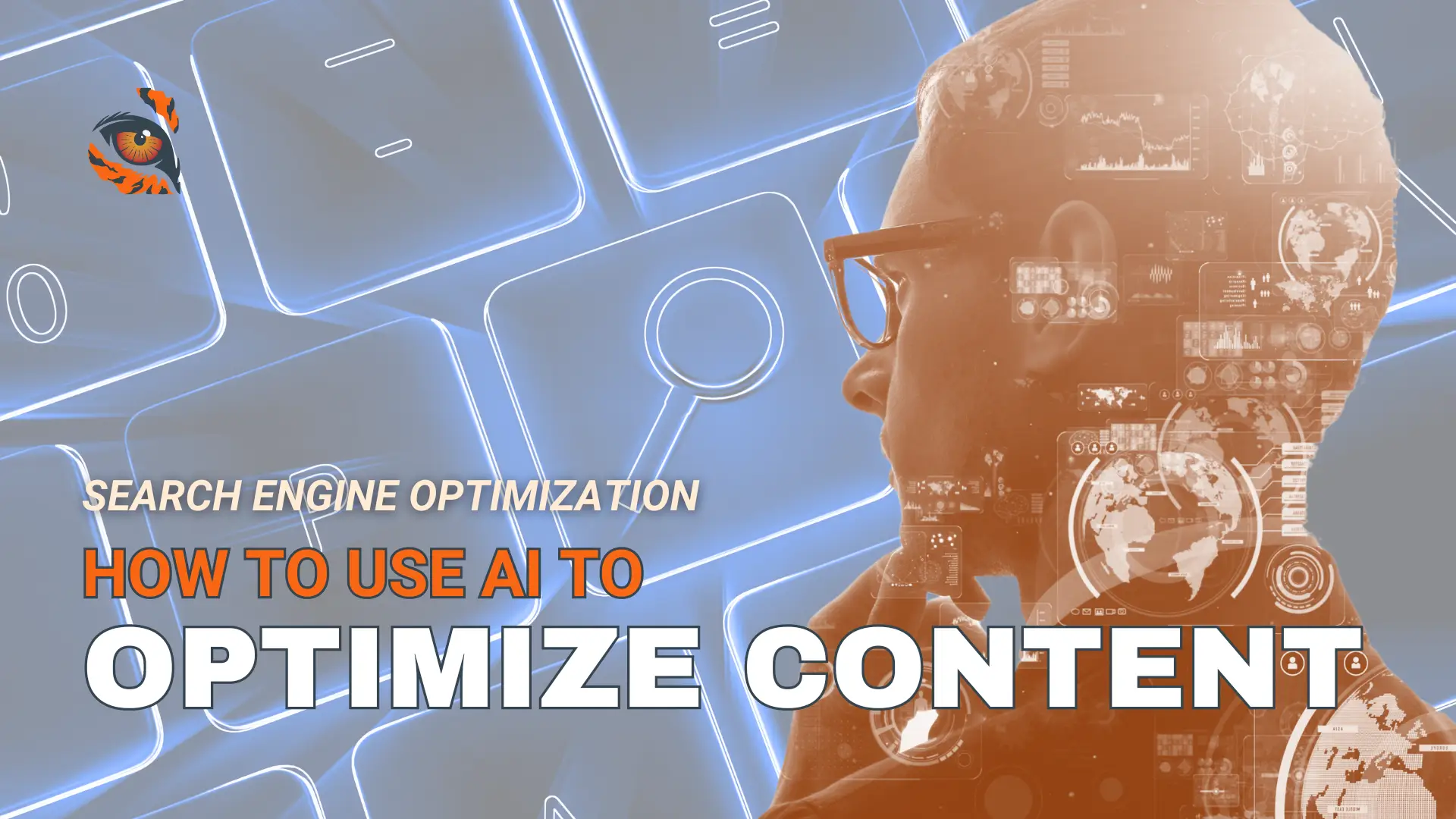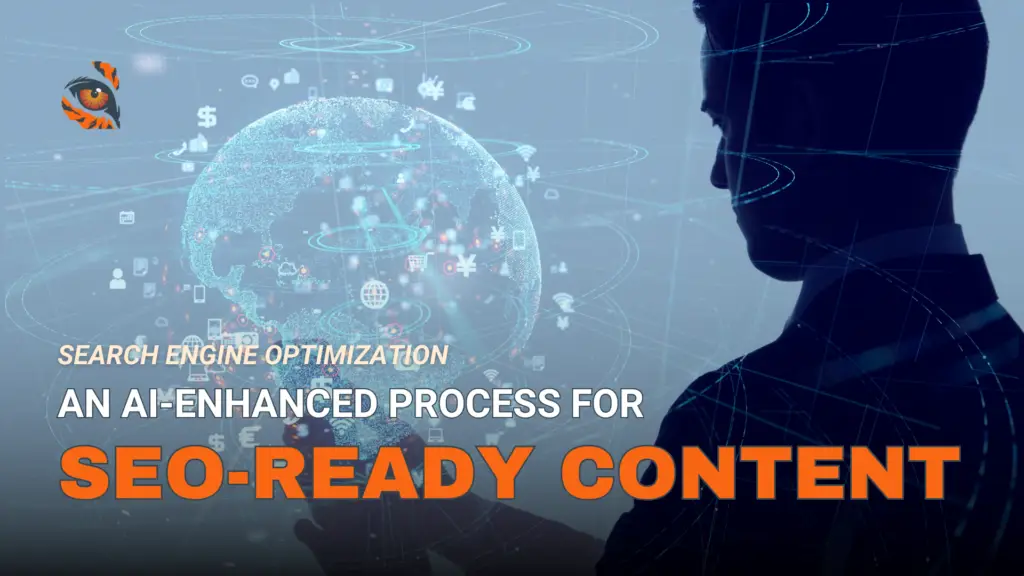How Beginners Can Use AI to Optimize Content for Search Engines

AI-powered SEO tools boost content ranking and performance by suggesting the right keywords, natural language, and user intent for your articles. AI tools can also structure your content and provide readability improvements that make it easier for search engines to crawl your content and award authority on its keywords.
By Jared Frank | 8 min read
Last Updated: February 11, 2025
Entrepreneurs, marketers, and content creators are all devouring AI content like catnip to learn how those two letters can improve their businesses. But for marketing professionals trying to get their products and services noticed online, it’s still about three different letters – SEO.
In simple terms, Search Engine Optimization helps your business show up in results when people search for your products or services on Google. SEO best practices are ever-evolving, and now AI plays a significant role in making your business visible online. So clearly defined, SEO remains the primo tactic. AI is just a tool to better deploy the tactic, a vital one overall for any high-performing content strategy.
For SEO beginners, the AI shift is an opportunity. Using AI tools to create SEO content offers a great way to compete in your category and geography. It’s easier than ever to provide high-quality, useful content that directly answers what customers are searching for. But be advised, high-quality content means more than just high-quality keywords. It must be helpful and provide real value.
AI also improves technical SEO requirements for ranking like website speed and user experience. And it does this site optimization without you needing to become an expert. By embracing AI-plus-SEO strategies, small businesses can improve their online presence, attract the right customers, and find a winning edge on the competition.
Let’s look at five actionable tips to quickly, easily, and affordably use AI to optimize content for search engines:
- Find the Best Keywords
- Optimize Your Content in Real-Time
- Stay Ahead of Google’s Algorithm Updates
- Analyze Your Competitors’ SEO Strategies
- Improve Your Local SEO
Key Takeaways
By focusing on keyword research, optimizing for user intent, and using clean structure and formatting, small businesses can create SEO-friendly content that not only resonates with search engines but also engages customers.
R&D (Rip Off & Duplicate) is a marketer’s best SEO friend. An audit of high-ranking competitors reveals their top keywords, content structure, and backlink sources. Those same tactics become the basis for your own content.
A Google Business Profile with location-specific keywords, accurate business details, and positive reviews helps you rank higher in local search results and attract more local customers.
Use AI to Find the Best Keywords to Optimize Content for Search Engines
Keyword research remains the foundation of SEO. But now AI tools analyze massive volumes of search data to find the most effective words and phrases your potential customers are typing into Google when looking for a business like yours. Focus on long-tail keywords, which are longer, more specific phrases (like “best vegan pizza in Brooklyn”) that attract niche audiences and are often less competitive and easier for small businesses to rank for.
Beyond primary keywords, AI tools suggest related secondary terms to include in your content as well. Put together, these keywords improve your chances of showing up on the first page of Google. And they help you target people who are closer to making a purchase decision.
Once you have a list of relevant keywords, the next step is to naturally incorporate them into your website content, blog posts, and product descriptions. But remember, don’t overdo it. Search engines reward content that feels natural and helpful, not keyword-stuffed.
Pro Tip:
User intent is also a top consideration for search engines. You need to create content that matches the intent behind the search.
So ask yourself: What does my audience really want when they search for this keyword? Craft your content around that answer.
Use AI Tools to Optimize Your Content in Real-Time
Writing content is one thing. Writing it for search engines is a whole other challenge. Search engines don’t just look at what your content says. They also care about how it’s organized. Well-structured content improves your website’s user experience and makes it easier for both search engines and people to understand, and that’s where formatting comes in.
AI tools for on-page SEO analyze your content as you write, offering suggestions for improving its structure and readability. These tools tell you if you’re using the right keywords enough (but not too much), whether your headlines are strong, and even if your content is too long or too short for search engines to love it. This way, you can make SEO tweaks while you’re creating your content, rather than worrying about it later.
Additionally, make sure your content is mobile-friendly. Many people search from their phones, and if your website doesn’t load quickly or display correctly on mobile devices, you could lose potential customers.
Pro Tip:
Use clear headings and subheadings (like H1, H2, H3) to break your content into sections. These headings not only guide readers through your content but also makes it easier for AI algorithms to scan and understand.
Bullet points and numbered lists are also great for organizing information, as are short paragraphs and sentences.
Use AI to Automatically Stay Ahead of Google’s Algorithm Updates
Google is constantly updating how it ranks websites, which can make it hard to keep up with SEO best practices. AI tools are designed to track these changes automatically and adjust their recommendations accordingly. Instead of having to research every update or worry about falling behind, let AI do the work for you.
Pro Tip:
The best part about using AI-driven SEO tools is that you don’t need to be an SEO expert to benefit from them.
The right tool for you is the one designed to be user-friendly and automate many of the complex SEO tasks.
Use AI Tools to Analyze Your Competitors’ SEO Strategies
To better understand why your competitors are ranking higher than you, it’s as easy as studying their keywords. AI tools scan competitor websites and reveal the keywords they are ranking for, the type of content using those keywords they are publishing as well as the publishing cadence, and how their pages are structured. By knowing what is working for them, you can craft content that better leverages those same keywords, user intent, and strategies.
Look closely at how your competitors structure their content. Are they using long-form blog posts with lots of headings and subheadings? Do they include infographics, videos, or other media elements to make their content more engaging?
Also, don’t forget to analyze your competitors’ backlinks. External sites linking to their content give them a boost in search rankings. Once you know which sites are valuable, you can work on building relationships with similar websites to earn backlinks for your own pages.
Pro Tip:
Don’t overthink it. Duplicate what is working for competitors, and apply similar tactics to your own content, improving upon its appeal to both search engines and users.
Use AI to Improve Your Local SEO
Improving your local SEO with location-specific keywords is essential for small businesses that depend on local customers. One of the most important steps in improving local SEO is ensuring your business has a Google Business Profile. Claiming and optimizing your Google Business Profile listing helps you appear in local search results, especially when people use terms like “near me” or search for businesses within a specific location.
It may sound obvious, but make sure your Google Business Profile is always current with your up-to-date address, phone number, website, and business hours. Add relevant categories that describe your business and upload high-quality photos to make your profile stand out. AI tools can help you fine-tune your listing by suggesting location-specific keywords that are trending in your area.
Additionally, encourage satisfied customers to leave positive reviews on your Google listing, as reviews play a crucial role in how local businesses rank. Positive reviews not only enhance your credibility but also attract more local customers.
Pro Tip:
Another important local SEO strategy is to build local backlinks. Identify local blogs, news outlets, or business directories that are good candidates for linking to your website.
By earning backlinks from reputable local sources, you boost your site’s authority and further improve your local search ranking.
SEO Is a Marathon, Not a Sprint
AI is transforming how businesses approach SEO. Small businesses can now achieve SEO proficiency quickly. But you can lose that proficiency just as quickly.
SEO is a marathon, not a sprint. And there is no finish line. You must always monitor progress, rankings, competitors, and algorithm updates.
Thankfully by leveraging AI, you can easily track in perpetuity key aspects of SEO like keyword research, content optimization, and algorithm changes, giving you an edge in a competitive market. These tools simplify and often automate complicated SEO tasks, making it easier for small businesses to focus on creating high-quality content that resonates with both search engines and users.
With AI, SEO never becomes a four-letter word. ![]()
Are you ready to start optimizing content for search engines? Let’s chat.
Write to Jared at [email protected].
Disclosure: ChatGPT helped ideate the first draft of this article. The author revised subsequent drafts and contributed original copy to better reflect the intended message and voice.
RELATED CONTENT

Using AI to Write Content That Customers Actually Want to Read
Many marketers dip their toes into AI waters believing their baptisms will yield instant results. But AI alone does not write well. Think of AI as a co-creator to enhance, not originate, marketing copywriting.

Blank Page to Published: How to Write SEO-Ready Content in 8 Simple Steps
The reports of the death of SEO are greatly exaggerated. Conversational AI tools like ChatGPT have shifted how people conduct research, but they don’t make SEO obsolete. They just require businesses to adapt.
